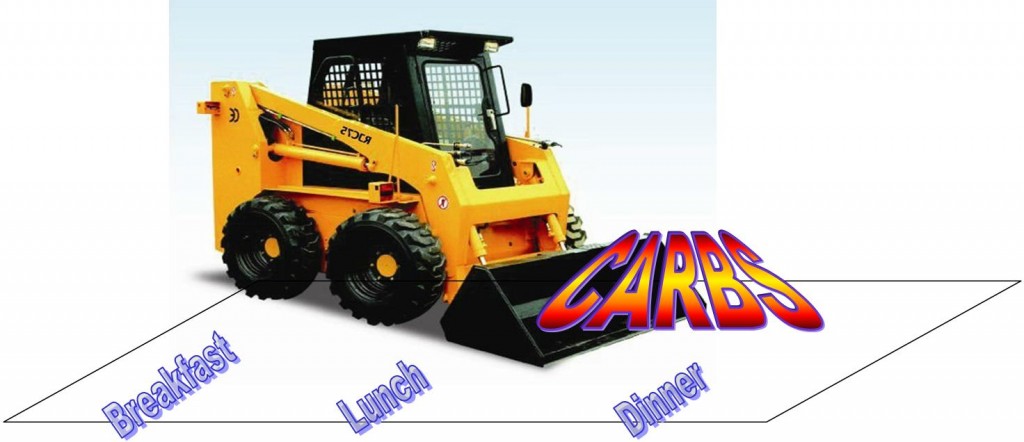THE CLAIM
What is Carb Back Loading? It appears to be one of the latest sports nutrition myths to hit the gyms. The claims are that it can help you to “lean out and gain muscle”. A recent article in Men’s Fitness explains it this way “As the name implies, this limits carb consumption to late in the day. Taking in carbs in the afternoon or evening is done for a strategic reason. Carbs make both muscle and fat cells grow—and often at the same time. But by shifting when you eat carbs, you can actually control which kind of tissue grows.” The recommendation is to severely limit carbs during the day on training days. From post-strength training until bedtime, intake of carbs is unlimited, including high fat and processed carbs like potato chips, pizza, and ice cream. The claim is that insulin released when carbs are ingested throughout the day inhibits fat loss and lean muscle mass gains.
THE TRUTH
I’m open to seeing research to support these claims, but without any, this goes against what I know to be true. Insulin is a storage hormone, so yes it has a role in storing fat and glycogen but it also stimulates carbohydrate oxidation (being burned for fuel) … so if you need the energy, you will utilize the carbohydrates (any time of day). Over-consumption of carbohydrates may result in some fat storage… and some glycogen storage. But that’s just how our body’s store energy, and if we need energy later in the day it will be pulled out of storage and burned. There is some effect of exercise that will affect the fate of carbohydrate, but that has more to do with timing relative to exercise vs. time of day. After exercise the muscles are primed to take up carbohydrates for a variety of reasons. There is increased insulin sensitivity making the muscles more responsive to insulin’s effect, and insulin, which is suppressed during exercise, rebounds making glucose uptake by the muscles 3 to 4 times higher than resting rates for about 60 minutes after exercise. So consuming carbohydrates after exercise will facilitate muscle uptake of glucose and sort of selectively “feed” the muscles. This is why sports dietitians recommend refueling with carbs within 30 to 60 minutes after exercise lasting 90 minutes or more. It facilitates storage of glycogen – the type of carbohydrate stored in the muscles and liver – so that next time we work out we will have more reserves to fuel our exercise. So the claims are a mix of truth and myth. Refueling with carbs after a workout is good. Excessively restricting carbs during the day is pointless.. and will probably negatively affect your work performance and moods since our brains run off of carbs (blood sugar).
The problem with many of these trends (i.e. nutrition myths) that we are currently seeing is that the authors/creators are taking research data from studies on sedentary subjects who have type 2 diabetes and/or metabolic syndrome, and extrapolating it to create theories about how things work in the general population. But in reality this data doesn’t translate to other populations accurately. Individuals with metabolic syndrome have insulin resistance and increased levels of circulating insulin in an attempt to compensate for it. So any carbohydrate consumed (apart from exercise… which would be the case for these sedentary test subjects) has a higher propensity to be stored – and most of our stored energy is in the form of fat. Additionally, insulin resistance is highest in the morning due to circadian rhythm of hormones, so these individuals do have a lower tolerance of CHO in the morning. HOWEVER… Fit individuals without metabolic disorders don’t have insulin resistance or hyperinsulinemia (excess circulating insulin), so their insulin response is just-in-time and is proportional to their needs… which doesn’t lead to over-storing energy as fat. In fact, people who exercise regularly have increased insulin sensitivity in general, so the body doesn’t need to produce as much insulin in response to food (and doesn’t). As long as there are no excessive calories consumed, there is no reason to believe there will be excess fat storage – in healthy, fit individuals – from consuming carbohydrates at any time of day. I see a plethora of testimonials about “carb back loading” on various sites on the web, but have not seen any research to back the claims…. which are faulty in light of the research that does exist.



Thank you for this information Sally. Many of my weight management clients already carb backload before they come to see me. They eat nothing much during the day and then eat a whole pantry full of carbs when they get home in the evening. I can say first hand that it doesn’t promote weight loss and muscle gain but it does promote fat gain with excessive calorie intake!